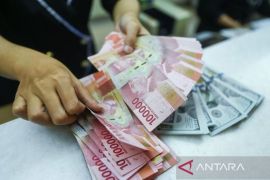Jakarta (Antara Bali) - The government's fiscal expansion strategy by increasing its expenditure is effective in boosting economic growth in the second quarter of 2016, economists said.
However, the economists expressed fear over the budget cut which they see could affect the growth in the short term.
Senior economist Eric Sugandi of the Kenta Institute said the government's counter cyclical strategy to increase growth and the people's purchasing power by accelerating its expenditure is effective.
"The counter cyclical strategy through increasing government expenditure and people's purchasing power to boost consumption in the second quarter of 2016 is effective to drive up growth," he said.
In the second quarter of 2016, the economic growth was recorded at 5.18 percent, increasing from 4.66 percent in the second quarter of 2015, thanks to the increase in the government's expenditure.
The government's expenditure increased from 2.61 percent in the first quarter to 6.28 percent in the second quarter or from Rp384.74 trillion to Rp474.28 trillion.
Economist Telisa Aulia Falianty of the Economic Faculty of the University of Indonesia appreciated the government's fiscal expansion by accelerating infrastructure development.
Eric Sugandi and Telisa Aulia Falianty shared the opinion on the government's step to cut its budget, saying that it would have negative impact on the economic growth in the short term.
They feared that the budget cut by the government to maintain fiscal stability would hamper growth. After all, Indonesia is one of the small number of states which maintain the balance of fiscal deficit at below three percent.
Other countries such as Malaysia, India and Japan which respectively has fiscal deficits of 3.7 percent, over 3.7 percent and minus 6.2 percent, used the fiscal instrument to boost growth.
"Although it could have negative impact on economic growth, the cut in government's expenditure should be implemented to assure that the deficit of state budget and regional budget would not exceed 3 percent of the gross domestic product (GDP). It would be better for the government not to take risk by not cutting the government's expenditure," Eric said.
This is regardless of expected proceeds of the tax amnesty program amounting to Rp165 trillion. "There is no guarantee the tax amnesty target will be achieved," Eric said.
He said the government's fiscal policy was already expansive in the second quarter of 2016, yet the condition of the 2016 revised 2016 state budget should also be taken into account.
Telisa is of the view that the budget cut would serve as a factor that would reduce the economic growth in the short term. However, it could be expected that there would be adjustment in the long run.
The short term impact of the expenditure reduction could be seen in the drop of the people's consumption and the reduction in the country's economic activities.
The tax amnesty program is also expected to boost economic growth in Indonesia. The government had better adopt the fiscal expansion strategy, she said.
"Yes, it should adopt the fiscal expansion, but the correct one which is done on the productive sectors for growth," she said. (WDY)









